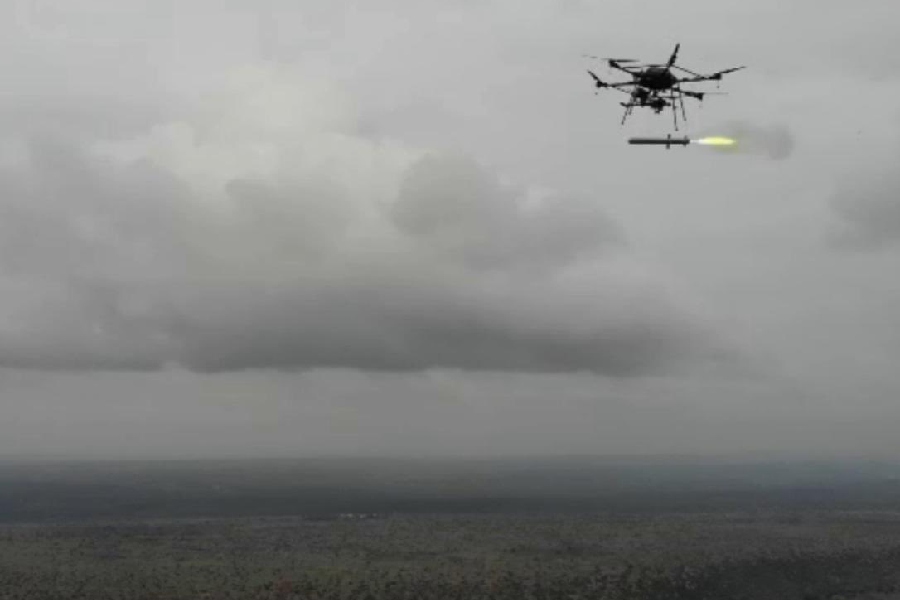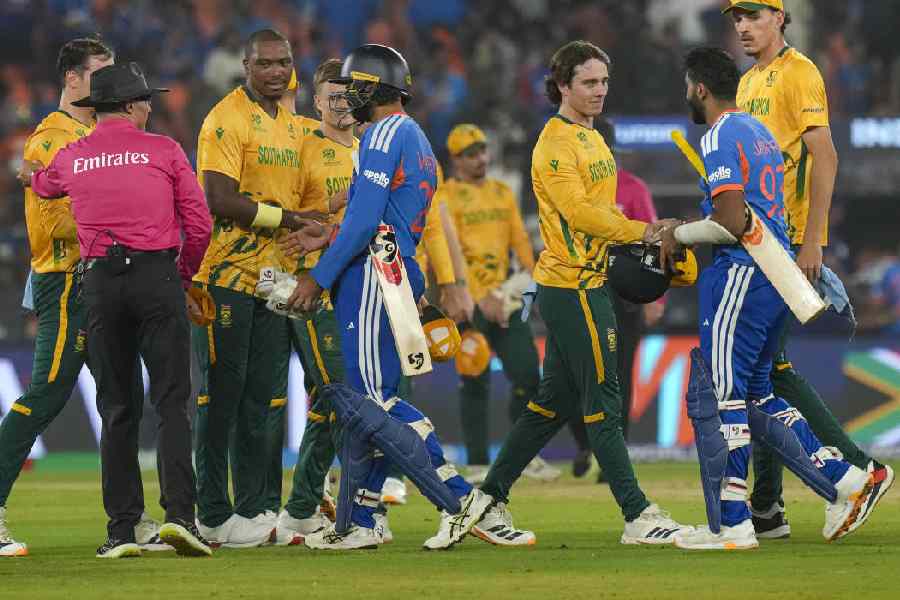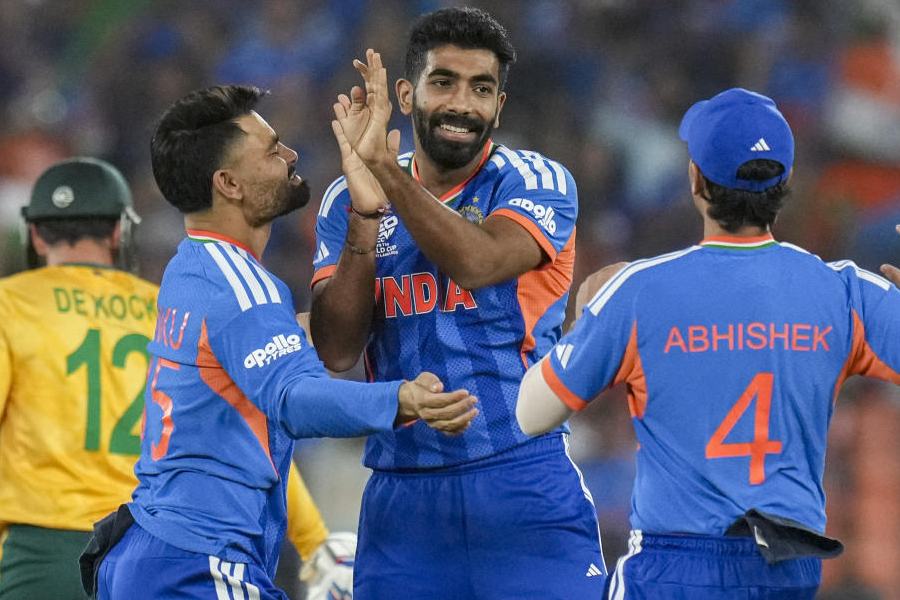 |
| Sujatha Singh with Ranjan Mathai in New Delhi on Wednesday. (PTI) |
Washington, July 31: Sujatha Singh, India’s new foreign secretary, promises to spring many surprises during her two-year tenure. Her first surprise will be on the Chinese when she accompanies Manmohan Singh to Beijing in October-November on the second of the Prime Minister’s two major foreign tours that are now in the planning stage. The first of these two tours will be to the US.
If the script during the Prime Minister’s visit goes according to the best traditions of diplomacy and protocol, the new foreign secretary will, in all likelihood, enchant the Chinese during a state banquet in the Great Hall of the People with her unique story as India’s only top diplomat to have got lost in China, wandered around and crossed the border back into India on her own while her husband and father, back in New Delhi, worried about her safety in Chinese hands.
The year was 1983 and India had just started sending pilgrims on the now annual ritual of a Kailash Mansarovar yatra. Sujatha, on her first home stint in the Indian Foreign Service (IFS) after learning German in Bonn and later perfecting it on posting in West Germany for four years, volunteered to be a liaison officer to the pilgrims on a pioneering and potentially dangerous mission.
As ill-luck would have it, the weather was unkind to this new initiative by the ministry of external affairs (MEA) that year. A section of the pilgrims, including the liaison officer, got cut off and separated from the rest of the group after they crossed the Lipulekh Pass and into China. There were no mobile phones then: in any case, rain and storms had disrupted even rudimentary communication by walkie-talkies.
Concern for Sujatha and the missing pilgrims mounted after bodies of two Indians who had got lost were discovered. The new foreign secretary has a passion for jogging, so her physical fitness to endure harsh conditions was never in doubt. According to another account, she was found inside China a week later and returned to safety on the Indian side of the border.
Adversity makes the best friends. Some of the pilgrims who were with her 30 years ago this month and are still in contact with her swear that she put their safety and welfare above her own during that challenge against nature.
This is the kind of story that no Sinophile in South Block can narrate to the Chinese during an after-dinner banter, not even national security adviser Shivshankar Menon, the repository of the best Chinese tales among Indian diplomats, including rare stories about his schooling in Tibet.
When Sujatha was under secretary in charge of Nepal for three years from 1982, she sprang a surprise on her boss, a pompous joint secretary who also was a khandani in the civil service tradition. His father, a product of the ICS, served as foreign secretary in the early decades of Independence.
The joint secretary never made a secret of his ambition to be ambassador to Nepal. Sujatha resented — although she was the junior-most officer in the MEA dealing with Kathmandu — that this ambition clouded the judgements of her boss on Nepal, which was already in turmoil five years before it finally became a democracy, nudged by New Delhi. She had the courage and conviction to stand up to the joint secretary and advise a course on Nepal that was radically different from the conventional wisdom being put out by her boss.
She surprised not only her boss but also the rest of her IFS fraternity because it is rare for an under secretary not to toe the line or to stray from the straight and narrow path of obedience to a joint secretary — especially three decades ago when there were not too many joint secretaries unlike today.
But when Rajiv Gandhi became Prime Minister and decided to teach Nepal’s monarchy a lesson, he relied heavily on Sujatha’s dissenting notes of that time although she had already left for Accra and later to Paris on postings by the time Nepal metamorphosed into a true democracy.
Since she was named as successor to Ranjan Mathai, there has been intense speculation, mostly in the corridors of South Block, on who would be at the receiving end of her call-a-spade-a-spade approach in the next two years. Sujatha would not hesitate to speak her mind even to the Prime Minister instead of hedging her bets on a post-retirement sinecure by being nice or telling the boss what he wants to hear.
But any kerfuffle involving her and Manmohan Singh appears unlikely since Sujatha, then ambassador to Berlin, immensely impressed the Prime Minister during his visit there in April with her out-of-the-box approach to relations with Germany.
For over two decades since P.V. Narasimha Rao reached out to German chancellor Helmut Kohl in search of a new relationship, bilateral relations have focused almost entirely on economic and commercial ties relying on the strengths of the German economy as the industrial engine of Europe.
But during her time in Berlin as envoy, Sujatha turned her attention to getting Germans involved in skill development and vocational training for Indians. Complemented by schemes for German language programmes in India, including BEd and MA courses, her plans envisage preparing a generation of Indians to embrace Germany the same way Indians have embraced Anglo-Saxon countries and their ways for centuries. This was an opportunity India should not miss, she argued.
As a result, the academic in the Prime Minister, disappointed that his vision for improving educational standards and opportunities for his countrymen with American help had failed to take off, became convinced that Germany, with its ageing and declining population, would be looking for outsiders trained in German ways to keep themselves going in the new millennium.
A source who knows the mind of the Prime Minister said she was “very German in her approach” on this subject, having trained in Germany and practised German language for four years on her maiden IFS posting. In the end the Prime Minister was persuaded enough to take human resource development minister Mangapati Pallam Raju with him to Berlin in April and sign a slew of agreements to take the matter forward.
Sujatha never took much interest in cricket until the Australians began acting difficult on uranium exports to India. She relentlessly pursued Kevin Rudd on cricket fields and at cricket parties even after he ceased to be Prime Minister until his opposition to a nuclear deal with India was softened and Canberra eventually reversed course. This time, surprise was on her husband Sanjay Singh, a retired IFS officer, and their two daughters when Sujatha began quoting cricket statistics to them.










